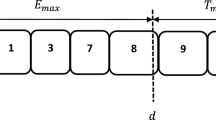Abstract
We study two due date assignment problems in various multi-machine scheduling environments. We assume that each job can be assigned an arbitrary non-negative due date, but longer due dates have higher cost. The first problem is to minimize a cost function, which includes earliness, tardiness and due date assignment costs. In the second problem, we minimize an objective function which includes the number of tardy jobs and due date assignment costs. We settle the complexity of many of these problems by either showing that they are \(\mathcal{NP}\) -hard or by providing a polynomial time solution for them. We also include approximation and non-approximability results for several parallel-machine problems.
Similar content being viewed by others
References
Achugbue, J. O., & Chin, F. Y. (1982). Scheduling the open shop to minimize mean flow time. SIAM Journal on Computing, 11, 709–720.
Baker, K. R., & Scudder, G. D. (1990). Sequencing with earliness and tardiness penalties: a review. Operations Research, 38, 22–36.
Bagchi, U., Sullivan, R. S., & Chang, Y. L. (1986a). Minimizing mean absolute deviation of completion times about a common due date. Naval Research Logistics, 33, 227–240.
Bagchi, U., Sullivan, R. S., & Chang, Y. L. (1986b). Minimizing mean squared deviation of completion times about a common due date. Management Science, 33, 894–906.
Birman, M., & Mosheiov, G. (2004). A note on due-date assignment in a two-machine flow-shop. Computers and Operations Research, 31(3), 473–480.
Bruno, J. L., Coffman, E. G., & Sethi, R. (1974). Scheduling independent tasks to reduce mean finishing time. Communications of the ACM, 17, 382–387.
Chen, Z. L. (1996). Scheduling and common due date assignment with earliness-tardiness penalties and batch delivery costs. European Journal of Operational Research, 93, 49–60.
Cheng, T. C. E., & Chen, Z. L. (1994). Parallel-machine scheduling problems with earliness and tardiness penalties. Journal of the Operational Research Society, 45, 685–695.
Cheng, T. C. E., & Kovalyov, M. Y. (1996). Batch scheduling and common due-date assignment on a single machine. Discrete Applied Mathematics, 70, 231–245.
Conway, W. L., Maxwell, W. L., & Miller, L. W. (1967). Theory of scheduling. Reading: Addison–Wesley.
De, P., Ghosh, J. B., & Wells, C. E. (1991). Optimal delivery time quotation and order sequencing. Decision Sciences, 22, 379–390.
De, P., Ghosh, J. B., & Wells, C. E. (1994). Due-date assignment and early/tardy scheduling on identical parallel machines. Naval Research Logistics, 41, 17–32.
Du, J.Y., & Leung, T. (1990). Minimizing total tardiness on one machine is \(\mathcal{NP}\) -hard. Mathematics of Operations Research, 15, 483–495.
Garey, M. R., & Johnson, D. S. (1979). Computers and intractability: a guide to the theory of \(\mathcal{NP}\) -completeness. San Francisco: Freeman.
Garey, M. R., Johnson, D. S., & Sethi, R. (1976). The complexity of flow shop and job shop scheduling. Mathematics of Operations Research, 1, 117–129.
Gordon, V., Proth, J. M., & Chu, C. B. (2002). A survey of the state-of-the-art of common due date assignment and scheduling research. European Journal of Operational Research, 139, 1–25.
Graham, R. L., Lawler, E. L., Lenstra, J. K., & Rinnooy Kan, A. H. G. (1979). Optimization and approximation in deterministic sequencing and scheduling: a survey. Annals of Discrete Mathematics, 5, 287–326.
Horn, W. A. (1973). Minimizing average flow time with parallel machines. Operations Research, 21, 846–847.
Kahlbacher, H. G., & Cheng, T. C. E. (1993). Parallel machine scheduling to minimize costs for earliness and number of tardy jobs. Discrete Applied Mathematics, 47, 139–164.
Kolliopoulos, S. G., & Steiner, G. (2007, in preparation). Approximation algorithms for scheduling problems with a modified total weighted tardiness objective.
Kovalyov, M., & Werner, F. (2002). Approximation schemes for scheduling jobs with common due date on parallel machines to minimize total tardiness. Journal of Heuristics, 8, 415–428.
Lawler, E. L., & Moore, J. M. (1969). A functional equation and its application to resource allocation and sequencing problems. Management Science, 16, 77–84.
Lenstra, J. K., Rinnooy Kan, A. H. G., & Brucker, P. (1977). Complexity of machine scheduling problems. Annals of Discrete Mathematics, 1, 343–362.
Mosheiov, G. (2001). A common due-date assignment problem on parallel identical machines. Computers and Operations Research, 28(8), 719–732.
Panwalkar, S. S., Smith, M. L., & Seidmann, A. (1982). Common Due date assignment to minimize total penalty for the one machine scheduling problem. Operations Research, 30, 391–399.
Panwalkar, S. S., & Rajagopalan, R. (1992). Single-machine sequencing with controllable processing times. European Journal of Operational Research, 59, 298–302.
Papadimitriu, C. H., & Steiglitz, K. (1982). Combinatorial optimization: algorithms and complexity. Englewood Cliffs: Prentice-Hall.
Rothkopf, M. H. (1966). Scheduling independent tasks on parallel processors. Management Science, 12, 437–447.
Seidmann, A., Panwalkar, S. S., & Smith, M. L. (1981). Optimal assignment of due dates for a single processor scheduling problem. International Journal of Production Research, 19, 393–399.
Shabtay, D., & Steiner, G. (2005). Two due date assignment problems in scheduling a single machine, Operations Research Letters, 34(6), 683–691.
Slotnick, S. A., & Sobel, M. J. (2005). Manufacturing lead-time rules: customer retention versus tardiness costs. European Journal of Operational Research, 169, 825–856.
Author information
Authors and Affiliations
Corresponding author
Additional information
This research was partially supported by the Paul Ivanier Center for Robotics and Production Management, Ben-Gurion University of the Negev. Partial support by the Natural Sciences and Engineering Research Council of Canada under Grant No. 041798 is also gratefully acknowledged.
Rights and permissions
About this article
Cite this article
Shabtay, D., Steiner, G. Optimal due date assignment in multi-machine scheduling environments. J Sched 11, 217–228 (2008). https://doi.org/10.1007/s10951-007-0015-y
Received:
Accepted:
Published:
Issue Date:
DOI: https://doi.org/10.1007/s10951-007-0015-y




